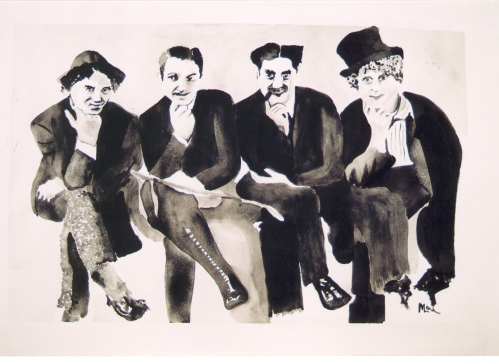
Benjamin Kunkel at n +1:
Something I did not learn from the newspaper—I had to be told by a friend—was that the Marxist political scientist Giovanni Arrighi had died, on June 18 of this year. There was no obituary in the Times, any more than there had ever been reviews of Arrighi’s books while he lived.
Marx wrote in the Grundrisse, the same friend recently reminded me, that the ultimate tendency of capital is to move “at the speed of thought.” This turns out to have been an underestimate on Marx’s part: even a quick thinker can’t turn over an idea in thirty milliseconds. Capitalist culture still moves a bit slower than capital itself, but the plain tendency of our present-day communiqués is toward instantaneous dissemination, a sparkle of fleet significance, and swift oblivion. People in the rich countries live longer today than ever before, even as the lifespans of our ideas, our feelings, our commitments, our fashions, our jobs, and the objects with which we surround ourselves shrink and shrink. One lives one’s long life in a cloud of mayflies.
[…]
Arrighi then read Adam Smith against the grain—as well as more closely, it should be added, than his conservative counterparts—to conclude that Wealth of Nations better described the China of the 18th century than the England of the 19th or the US of the 20th. The result of all this was that Arrighi found it possible to believe that the China of the future might retain or recover a non-capitalist market economy: a way of doing things more efficient, more egalitarian, and more sustainable than any we in the West have known. This optimism (sometimes called “neo-Smithian Marxism”) could seem too ingenious to be persuasive—but Adam Smith in Beijing must still be among the very best and most interesting books anyone has written about the deep history and far future of our contemporary political economy. Even the gaps in Arrighi’s historical logic reminded you how rare he was in having articulated such a logic; others had nothing but gaps.
It’s too bad that Arrighi will not be around to confirm or refine his theses—theses bearing vitally on the whole human future—of a sustainable China and a non-capitalist market. This is the final methodological problem for any student of the longue durée: he lacks the longevity enjoyed by his objects of study. But books, of course, survive, and few serve better than Arrighi’s for helping you to look up from the stock ticker, the headline crawl, and the tweets to see something vast and slow and violent turning like a planet on its axis.

Here is a good debate proposition: It ought to be less embarrassing to have been influenced by Ayn Rand than by Karl Marx.
The most powerful way to argue the affirmative is to compare the number of human beings murdered by the devotees of each. That line of attack ought to be decisive, but I’m afraid it won’t get you far with the multitude of highly-self-regarded thinkers influenced by Karl Marx. Fact is, commitment to some kind of socialism and fluency in the jargon of Marxism used to be mandatory for serious intellectuals. And there’s something glamorous in the very idea of the intellectual. Even for those of us who came of age after 1989, Marxism, like cigarettes, remains linked by association to the idea of the intellectual, and so, like cigarettes, shares in the intellectual’s glamour. I don’t know if cigarettes or Marxism have killed more people, but it’s pretty clear cigarettes are more actively stigmatized. Marxists, neo-Marxists, crypto-Marxists, post-Marxists, etc. have an enduring influence on intellectual fashion. So it is not only possible proudly to confess Marx’s influence on one’s thought, but it remains possible in some quarters to impress by doing so. It ought to be embarrassing, but it isn’t. Being a bit of a Marxist is like having a closet full of pirate blouses but never having to worry.
Why am I thinking about this? Because I ran across this N+1 blog post by Benjamin Kunkel about a recently departed Marxist historian named Giovanni Arrighi. I had never heard of Giovanni Arrighi. Should I be embarrassed about this? I’m not, though I’m willing to be convinced. Kunkel seems impressed with himself for being impressed with Arrighi. I wonder whether this should be a source of embarrassment for Kunkel. Knowing nothing about Arrighi I can’t be sure, but I can suspect.
Jonah Goldberg at The Corner on Wilkinson:
He then takes it in a very different (but enjoyable) direction, but I think the proposition is a great one and should be thrown up in lots of debates and discussions, particularly on college campuses. Professors will roll their eyes as will countless leading liberals (many of whom were indisputably and vastly more influenced by Marx than Rand, albeit sometimes second or third hand). It says something profound about the center of gravity in our culture that intellectuals, academics, and journalists are more inclined to think of Rand sympathizers as “extremists” or “ideologues” and Marx sympathizers (i.e. neo-Marxists, crypto-Marxists, post-Marxists, etc) as mainstream and thoughtful scholars.
All of this leaves aside that you could make the nearly same point, even more dramatically, by replacing Ayn Rand with Adam Smith or even Milton Friedman.
Update: A reader asks why I say “nearly the same point” rather than the same point. It’s a good question, I think. My short answer is that if you said Milton Friedman or Adam Smith you would capture pretty much all of the mainstream Right including the libertarians. Rand, however, is more controversial on the Right and, while I doubt many conservatives would easily admit it, it sure seems that in real life there are some conservatives more comfortable associating with some flavors of Marxist than associating with avowed Randians. There are probably some interesting cultural factors at work there, but I think it’s revealing nonetheless.
I have no desire to reopen old wounds, but one need only look at the masthead of NR when Whittaker Chambers defenestrated Rand in these pages to prove that point.

As someone who doesn’t consider himself a Marxist, let me tell you about my new philosophy: Kill Everyone West Of The Mississippism. I made it up approximately three minutes ago, I am its only adherent, and its only tenet is that those living west of the Mississippi River (going around the globe until you reach the eastern bank of the river, so this includes everyone) must die. And die painfully.
Now, I’m pretty that that some Objectivist, somewhere, has murdered someone. No adherent to my ideology has committed a crime worse than speeding. Even then, there are questions about the radar gun. By this standard, my philosophy of glorious, indiscriminate murder is less embarrassing than Objectivism. I think Objectivism is an asinine, unworkable philosophy that has influenced fewer people than Marxism because most people grow out of susceptibility to it by age 14, but I still think it’s more respectable than my new philosophy of subsidizing heroin use by minors and killing everyone.
I await Mr. Wilkinson’s rebuttal.
It’s really quite appalling that being a Marxist remains a sign of prestige in academia, instead of being met with opprobrium.

Will’s a very smart guy, and naturally, is not exactly predisposed to be a fan of Marx. But still, this is just silly. Although Rand was writing some 100 years after Marx, if you just look at the academic work influenced by the two, it’s pretty easy to see which lodestar would be more embarrassing. On one side, I present to you much of the British historical profession in the 20th century, including luminaries who, despite occasionally noxious and naive politics, were (and are) great scholars; Eric Hobsbawm, Christopher Hill, E.B. Thompson. Not to mention the literary theorists, sociologists, anthropologists, political theorists and scholars in just about every field who are deeply indebted to Marx. Carrying the Randian torch, on the other hand are…Leonard Peikoff? Alan Greenspan? Chris Sciabarra?
So when Wilkinson says that “Marxists, neo-Marxists, crypto-Marxists, post-Marxists, etc. have an enduring influence on intellectual fashion,” he seems to dismiss out of hand that the “enduring influence” might be a result of a Marxian scholarly program bearing fruit in all these fields. Now, I’m not saying that the Marxist interpretation or approach to anything is necessarily always correct, or even the best approach, but Marxist and Marxist-derived ideas are certainly useful in a great many scholarly endeavors. Now, I’m sure that Will believes, in good faith, that “Standard, non-Marxist economic history is not only better history, but equally sweeping,” but surely he can see why others may disagree.
